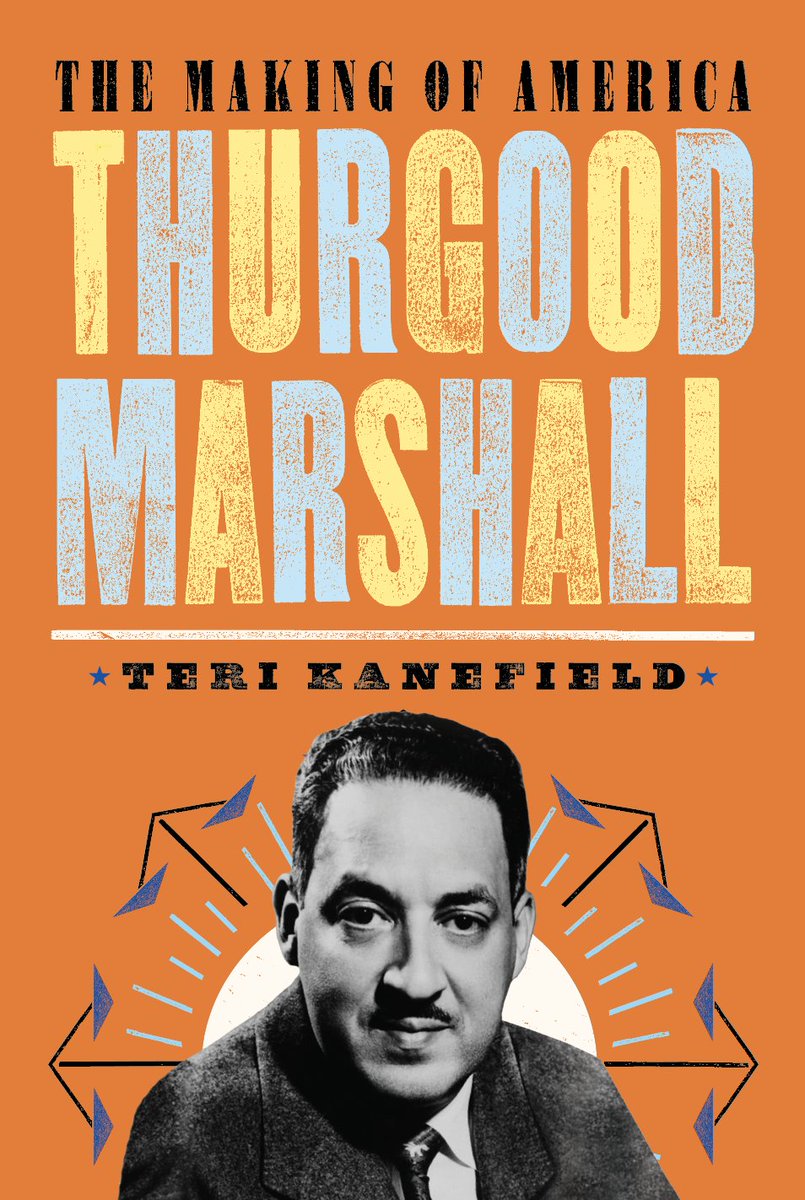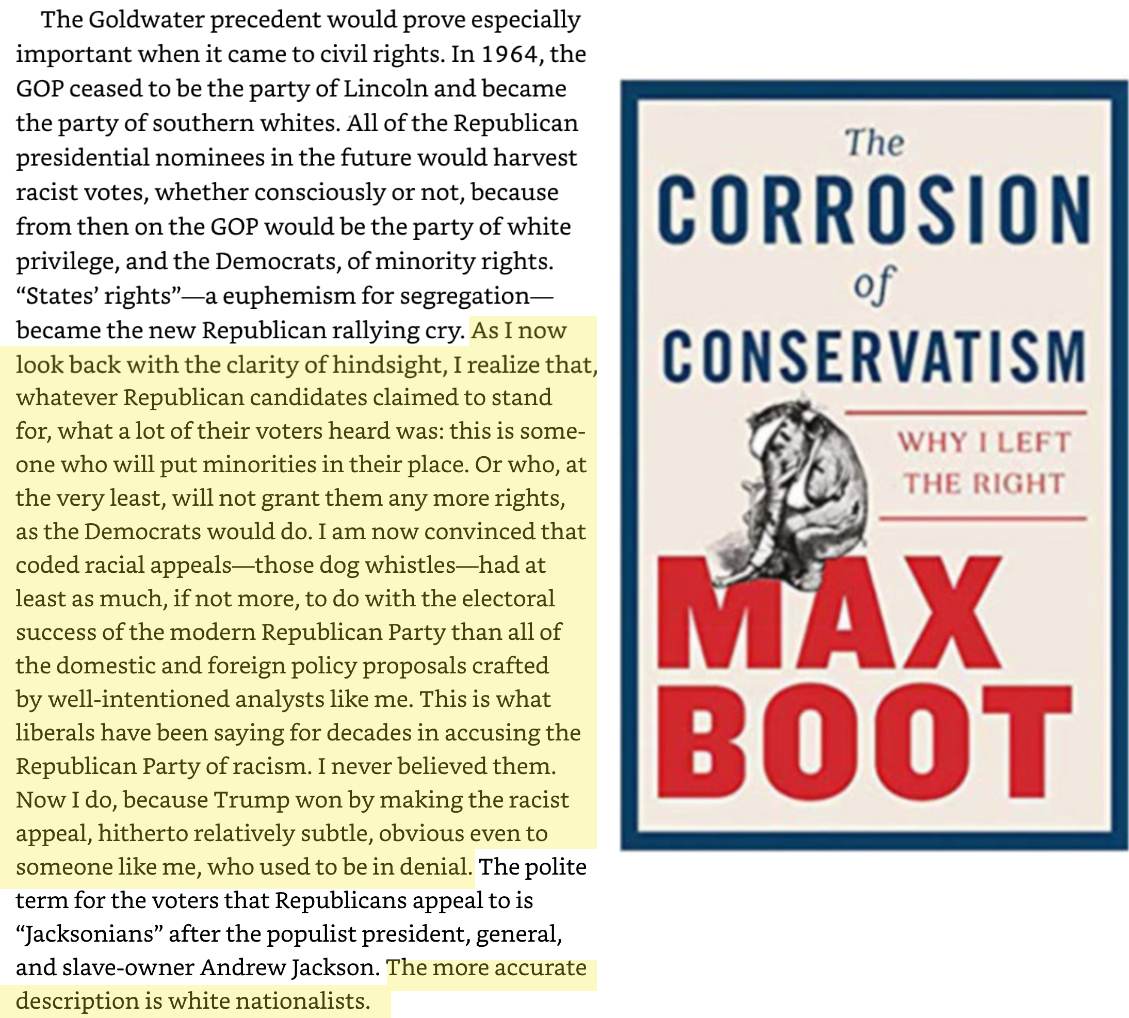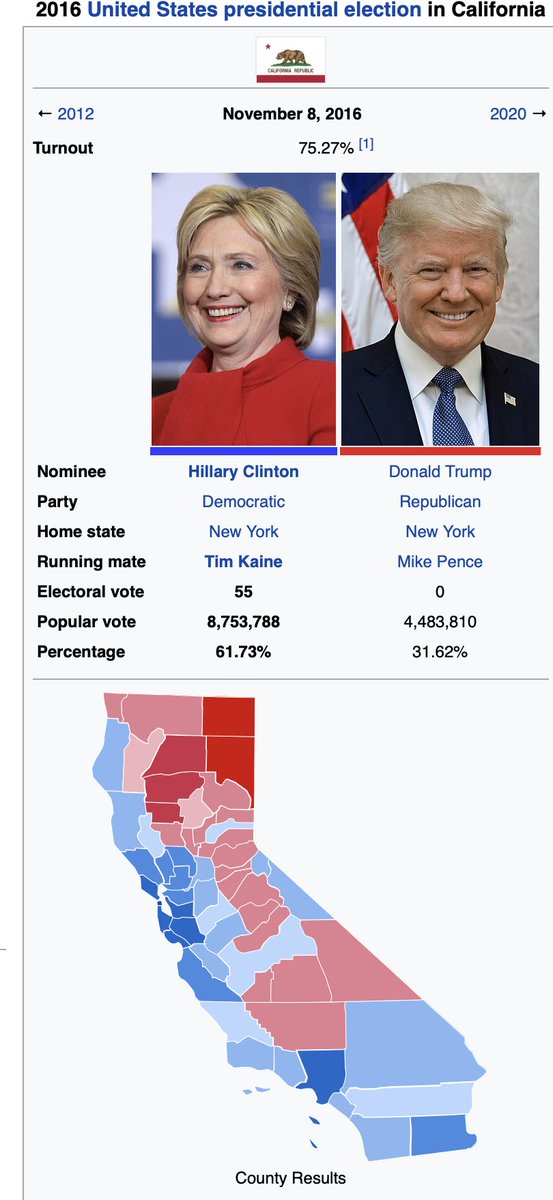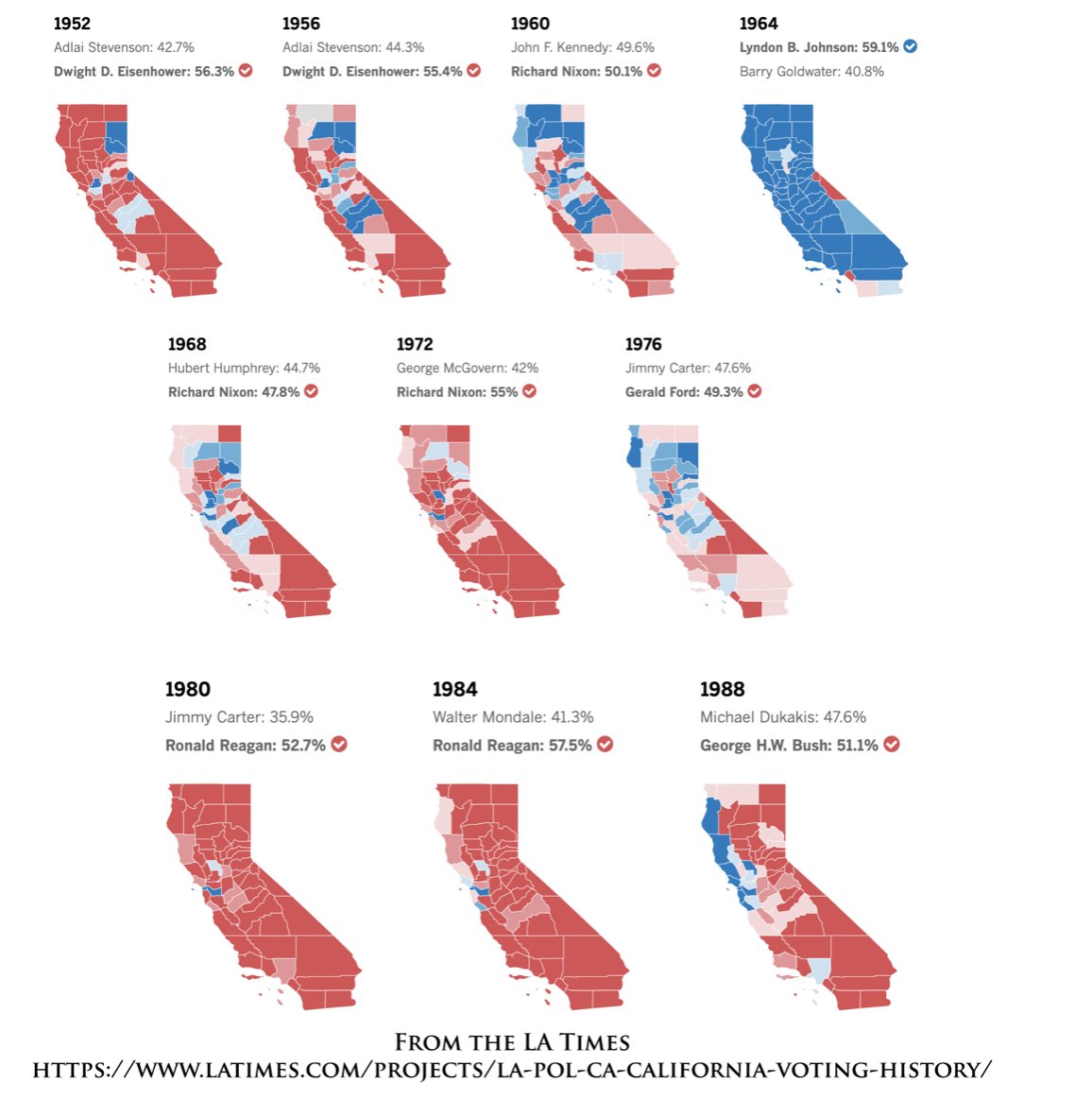(Thread) The Future of the GOP: Part III
Part I begins here: https://twitter.com/Teri_Kanefield/status/1302665636246515712
I">https://twitter.com/Teri_Kane... left off my history with the period of relative harmony between the parties, from about 1920 until the 1950s.
Then on May 17, 1954, the Supreme Court decided Brown v. Board of Education.
Part I begins here: https://twitter.com/Teri_Kanefield/status/1302665636246515712
I">https://twitter.com/Teri_Kane... left off my history with the period of relative harmony between the parties, from about 1920 until the 1950s.
Then on May 17, 1954, the Supreme Court decided Brown v. Board of Education.
1/ Brown is one of the most important cases in U.S. history. It declared racial segregation in schools illegal and paved the way for racial equality.
Charles Houston, Thurgood Marshall, and their team worked for decades to overturn Plessy.
Charles Houston, Thurgood Marshall, and their team worked for decades to overturn Plessy.
2/ I’ll cite my own book as a source. Why not, right?
Brown v. Board also marked the end of the era of civility between the two parties.
Shortly after Brown v. Board was decided, Rosa Parks refused to give up her seat to a white man, sparking the modern civil rights movement.
Brown v. Board also marked the end of the era of civility between the two parties.
Shortly after Brown v. Board was decided, Rosa Parks refused to give up her seat to a white man, sparking the modern civil rights movement.
3/ The women’s movement followed from (and by some accounts, arose from) the Civil Rights Movement, powered by black women (like Pauli Murray https://abs.twimg.com/emoji/v2/... draggable="false" alt="⤵️" title="Nach rechts zeigender Pfeil mit Krümmung nach unten" aria-label="Emoji: Nach rechts zeigender Pfeil mit Krümmung nach unten">) who led the civil rights charge.
https://abs.twimg.com/emoji/v2/... draggable="false" alt="⤵️" title="Nach rechts zeigender Pfeil mit Krümmung nach unten" aria-label="Emoji: Nach rechts zeigender Pfeil mit Krümmung nach unten">) who led the civil rights charge.
The call for equality unleashed fury and anger.
The call for equality unleashed fury and anger.
4/ Those opposed to the Brown decision used the same argument the Confederacy had used: States should be free to decide. SCOTUS overreached.
When the Democrats embraced civil rights, the period of harmony between the parties ended.
When the Democrats embraced civil rights, the period of harmony between the parties ended.
5/ About this time, what @HC_Richardson calls the Movement Conservatives arose, fueled by determination to dismantle the New Deal, which included all the regulatory agencies that prevented white men from cheating and looting.
For more on that, see: https://twitter.com/Teri_Kanefield/status/1070708168949346304">https://twitter.com/Teri_Kane...
For more on that, see: https://twitter.com/Teri_Kanefield/status/1070708168949346304">https://twitter.com/Teri_Kane...
6/ White evangelicals similarly despised federal government intervention. Problems, they believed, should be left to God. The culture was patriarchal & authoritarian. (see @C_Stroop& #39;s https://www.playboy.com/read/in-billy-we-trust">https://www.playboy.com/read/in-b...
7/ Thus libertarians (who were opposed to any federal intervention) the KKK, and white evangelicals found themselves with a common goal: Dismantle the federal government.
The GOP devised the “Southern Strategy” to expand its base.
@MaxBoot sums up what happened next here:
The GOP devised the “Southern Strategy” to expand its base.
@MaxBoot sums up what happened next here:
8/ We’re still riding the backlash from Brown v. Board.
In fact, the backlash propelled Trump to the White House.
Political psychologists like @karen_stenner tell us that about 1/3 of the population has an authoritarian disposition. http://www.karenstenner.com"> http://www.karenstenner.com
In fact, the backlash propelled Trump to the White House.
Political psychologists like @karen_stenner tell us that about 1/3 of the population has an authoritarian disposition. http://www.karenstenner.com"> http://www.karenstenner.com
9/ A certain portion of the population will always resist democracy and diversity.
https://www.karenstenner.com"> https://www.karenstenner.com
One possibility for the immediate future (meaning the next 10-20 years) is that the GOP digs in as a white nationalist party.
https://www.karenstenner.com"> https://www.karenstenner.com
One possibility for the immediate future (meaning the next 10-20 years) is that the GOP digs in as a white nationalist party.
10/ As the GOP loses elections, and a Democratic-held government institutes reform, we can expect (if the political psychologists are correct) the GOP to shrink to about 1/3 of the population.
Look at how California voted in 2016:
Look at how California voted in 2016:
11/ In fact, the story of how California went from ruby red to deep blue gives one possibility of what can happen in the US.
This chart shows how Californians voted from 1952-1988.
This chart shows how Californians voted from 1952-1988.
12/ Until about 1991, California was a hotspot for what @heathercoxrichardson calls the Cowboy Myth. See: https://twitter.com/Teri_Kanefield/status/1299042356679720960
We">https://twitter.com/Teri_Kane... owned the Japanese internment camps in WWII.
We gave the nation Nixon and Reagan.
We">https://twitter.com/Teri_Kane... owned the Japanese internment camps in WWII.
We gave the nation Nixon and Reagan.
13/ California always had minority communities. Spanish speakers and native people were here first. The Chinese were among the first to settle San Francisco, after having built most of the railroads.
But the electorate was mostly white due to (you guessed it) voter suppression.
But the electorate was mostly white due to (you guessed it) voter suppression.
14/ Specifically, we had rampant (illegal) voter suppression against non-English speaking citizens.
California’s “Latino and Asian populations boomed in the 1990s.”
https://www.latimes.com/projects/la-pol-ca-california-voting-history/
This">https://www.latimes.com/projects/... alarmed a certain segment of the population.
California’s “Latino and Asian populations boomed in the 1990s.”
https://www.latimes.com/projects/la-pol-ca-california-voting-history/
This">https://www.latimes.com/projects/... alarmed a certain segment of the population.
15/ In the late 1980s and early 1990s came a candidate, Pete Wilson, stoking fears of immigrants.
Here is one of Gov. Wilson’s 1994 reelection campaign ads: https://www.youtube.com/watch?v=lLIzzs2HHgY
“They">https://www.youtube.com/watch... keep coming . . .” So Trumpian, it& #39;s almost like it served as a model for Trump ads.
Here is one of Gov. Wilson’s 1994 reelection campaign ads: https://www.youtube.com/watch?v=lLIzzs2HHgY
“They">https://www.youtube.com/watch... keep coming . . .” So Trumpian, it& #39;s almost like it served as a model for Trump ads.
16/ Wilson won the election, helped by voter suppression.
https://gould.usc.edu/students/journals/rlsj/issues/assets/docs/issue_17/09_California_Macro.pdf
Wilson’s">https://gould.usc.edu/students/... signature law, Prop 187 (“Save our State”) was a hateful piece of anti-immigrant anti-minority legislation. #page_scan_tab_contents">https://www.jstor.org/stable/2547004?seq=1 #page_scan_tab_contents">https://www.jstor.org/stable/25...
https://gould.usc.edu/students/journals/rlsj/issues/assets/docs/issue_17/09_California_Macro.pdf
Wilson’s">https://gould.usc.edu/students/... signature law, Prop 187 (“Save our State”) was a hateful piece of anti-immigrant anti-minority legislation. #page_scan_tab_contents">https://www.jstor.org/stable/2547004?seq=1 #page_scan_tab_contents">https://www.jstor.org/stable/25...
17/ Prop 187 denied undocumented persons non-emergency health care, access to schools, etc.
It stoked anger against non-whites.
Shocked into action by Prop. 187, liberals and minority communities organized.
It stoked anger against non-whites.
Shocked into action by Prop. 187, liberals and minority communities organized.
18/ Lawsuits were filed challenging the voter suppression. Voter drives were organized. Lawyers formed voter protection orgs. Prop. 187 was successfully challenged in the courts.
By 2000, CA was mostly Democratic.
But all wasn’t well.
By 2000, CA was mostly Democratic.
But all wasn’t well.
19/ California had a 2/3 rule, which required 2/3 vote among lawmakers before anything could pass.
https://www.ocregister.com/2010/10/01/two-thirds-majority-rule-confounds-budget-process/
This">https://www.ocregister.com/2010/10/0... meant the GOP—now a minority—could hold up the works. The 2/3 rule gave them great power. They could be obstructionists.
https://www.ocregister.com/2010/10/01/two-thirds-majority-rule-confounds-budget-process/
This">https://www.ocregister.com/2010/10/0... meant the GOP—now a minority—could hold up the works. The 2/3 rule gave them great power. They could be obstructionists.
20/ This was the part of the plot where the party representing a shrinking majority holds disproportionate power, and uses that power to obstruct.
Sound familiar?
Sound familiar?
21/ To get anything done, California either had to:
 https://abs.twimg.com/emoji/v2/... draggable="false" alt="🔹" title="Kleine blaue Raute" aria-label="Emoji: Kleine blaue Raute">get rid of the 2/3 rule,
https://abs.twimg.com/emoji/v2/... draggable="false" alt="🔹" title="Kleine blaue Raute" aria-label="Emoji: Kleine blaue Raute">get rid of the 2/3 rule,
 https://abs.twimg.com/emoji/v2/... draggable="false" alt="🔹" title="Kleine blaue Raute" aria-label="Emoji: Kleine blaue Raute">let the Republicans shut everything down until they got their way, or,
https://abs.twimg.com/emoji/v2/... draggable="false" alt="🔹" title="Kleine blaue Raute" aria-label="Emoji: Kleine blaue Raute">let the Republicans shut everything down until they got their way, or,
 https://abs.twimg.com/emoji/v2/... draggable="false" alt="🔹" title="Kleine blaue Raute" aria-label="Emoji: Kleine blaue Raute">work hard on elections until 2/3 of the elected representatives were Democrats.
https://abs.twimg.com/emoji/v2/... draggable="false" alt="🔹" title="Kleine blaue Raute" aria-label="Emoji: Kleine blaue Raute">work hard on elections until 2/3 of the elected representatives were Democrats.
Guess which happened?
Guess which happened?
22/ We did it the hard way: Worked hard on elections.
https://www.usnews.com/news/best-states/california/articles/2018-11-12/democrats-gain-veto-proof-majority-in-california-legislature
I’ve">https://www.usnews.com/news/best... heard some absurd arguments for how California really turned blue, but I won’t refute them here.
OK, Ok. I’ll refute two of them.
https://www.usnews.com/news/best-states/california/articles/2018-11-12/democrats-gain-veto-proof-majority-in-california-legislature
I’ve">https://www.usnews.com/news/best... heard some absurd arguments for how California really turned blue, but I won’t refute them here.
OK, Ok. I’ll refute two of them.
23/ False Claim #1: The supermajority happened because conservatives fled after California started enacting liberal policies.
How silly is that? Liberal policies couldn’t happen until AFTER Democrats had a supermajority.
How silly is that? Liberal policies couldn’t happen until AFTER Democrats had a supermajority.
24/ False Claim #2: California turned blue because white workers left CA because it became too expensive, leaving only wealthy “elites.”
This one is just as silly.
First, we have a $12 minimum wage and lots of protection for workers.
This one is just as silly.
First, we have a $12 minimum wage and lots of protection for workers.
25/ Second, we have a very progressive tax code, meaning the rich pay more taxes (which is good for workers).
https://taxfoundation.org/which-states-have-most-progressive-income-taxes-0/
Third,">https://taxfoundation.org/which-sta... most of California& #39;s workers weren’t white. Why would only white workers leave the state for economic reasons?
https://taxfoundation.org/which-states-have-most-progressive-income-taxes-0/
Third,">https://taxfoundation.org/which-sta... most of California& #39;s workers weren’t white. Why would only white workers leave the state for economic reasons?
26/ Aside: Given how California finally turned blue (the hard way, campaigning, one election at a time) you can see why I& #39;m a believer that elections fix problems—even problems in which a minority holds most of the power because it obstructs and suppresses votes.
27/ Part III is getting long, so I& #39;ll pick up with Part IV later.
Another aside: When I first started on Twitter someone said you can& #39;t express complex ideas on Twitter.
Me (having learned to embed threads in other threads): "I bet I could write a PhD dissertation on Twitter" https://abs.twimg.com/emoji/v2/... draggable="false" alt="🤣" title="Lachend auf dem Boden rollen" aria-label="Emoji: Lachend auf dem Boden rollen">
https://abs.twimg.com/emoji/v2/... draggable="false" alt="🤣" title="Lachend auf dem Boden rollen" aria-label="Emoji: Lachend auf dem Boden rollen">
Another aside: When I first started on Twitter someone said you can& #39;t express complex ideas on Twitter.
Me (having learned to embed threads in other threads): "I bet I could write a PhD dissertation on Twitter"

 Read on Twitter
Read on Twitter
 ) who led the civil rights charge. The call for equality unleashed fury and anger." title="3/ The women’s movement followed from (and by some accounts, arose from) the Civil Rights Movement, powered by black women (like Pauli Murrayhttps://abs.twimg.com/emoji/v2/... draggable="false" alt="⤵️" title="Nach rechts zeigender Pfeil mit Krümmung nach unten" aria-label="Emoji: Nach rechts zeigender Pfeil mit Krümmung nach unten">) who led the civil rights charge. The call for equality unleashed fury and anger." class="img-responsive" style="max-width:100%;"/>
) who led the civil rights charge. The call for equality unleashed fury and anger." title="3/ The women’s movement followed from (and by some accounts, arose from) the Civil Rights Movement, powered by black women (like Pauli Murrayhttps://abs.twimg.com/emoji/v2/... draggable="false" alt="⤵️" title="Nach rechts zeigender Pfeil mit Krümmung nach unten" aria-label="Emoji: Nach rechts zeigender Pfeil mit Krümmung nach unten">) who led the civil rights charge. The call for equality unleashed fury and anger." class="img-responsive" style="max-width:100%;"/>





